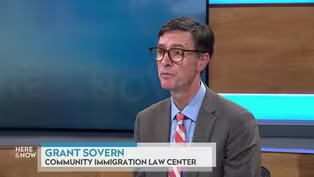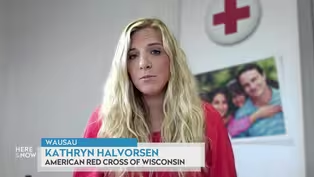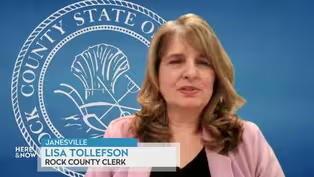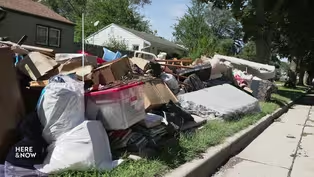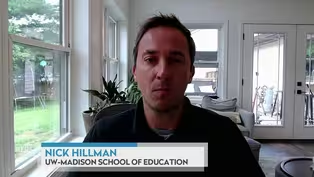Here and Now
Here & Now for August 22, 2025
Season 2400 Episode 2407 | 26m 47sVideo has Closed Captions
Watch the entire episode of Here & Now for August 22.
Watch the entire episode of Here & Now for August 22.
Problems playing video? | Closed Captioning Feedback
Problems playing video? | Closed Captioning Feedback
Here and Now is a local public television program presented by PBS Wisconsin
Here and Now
Here & Now for August 22, 2025
Season 2400 Episode 2407 | 26m 47sVideo has Closed Captions
Watch the entire episode of Here & Now for August 22.
Problems playing video? | Closed Captioning Feedback
How to Watch Here and Now
Here and Now is available to stream on pbs.org and the free PBS App, available on iPhone, Apple TV, Android TV, Android smartphones, Amazon Fire TV, Amazon Fire Tablet, Roku, Samsung Smart TV, and Vizio.
Providing Support for PBS.org
Learn Moreabout PBS online sponsorshipPBS Wisconsin original production.
>> It's bad.
And we still dealing with things around here.
>> Milwaukee.
Cleanup continues from floodwater.
Calamity and FEMA officials arrived to assess the damage to determine if there will be federal aid.
[MUSIC] tonight on "Here& Now".
While Milwaukee waits to see if federal aid will emerge, the Red cross is putting out an urgent call for volunteers.
[MUSIC] doubled since January.
What does this mean for people in Wisconsin?
Presidential threats to alter election systems renews misinformation over mail in ballots and tabulators, and changes to student loans may impact the job landscape.
It's "Here& Now" for August 22nd.
[MUSIC] >> Funding for Here and Now is provided by the Focus Fund for Journalism and Friends of PBS Wisconsin.
>> Following historic flooding in southeast Wisconsin, Milwaukee County's latest estimates on damage to public infrastructure has reached at least $34 million, a figure that doesn't include individual property loss.
The Federal Emergency Management Agency arrived this week to help the state with a preliminary damage assessment, the first step toward potential financial assistance.
>> Hi, I'm with FEMA.
>> FEMA is going door to door in southeast Wisconsin over the next several days looking to understand the magnitude of damage caused by recent record flooding.
>> Any rain water in your basement?
>> Our teams will go wherever the state and the county requests that we go.
We will see as much damage as they ask us to see.
We have four teams in Milwaukee County, one in Waukesha County and one in Washington County.
>> Accompanied by local officials, their objective is to ask questions and collect information.
>> Prior to this, we've been working to coordinate all the information reports so that we could give that picture to whim and to the FEMA representatives of the damage that we've experienced in the community.
>> 211 has been flooded with thousands of daily calls from residents reporting their losses.
>> Flooded basements, foundational damage.
A lot of people with lost possessions and couches and furniture and things like that.
So a lot of folks here are hurting.
>> You know, I'm disabled, I need help.
>> People like Tyrone Roberts.
>> We never had this much trash on our block.
Now the garbage man won't even come down the street, so we just got to deal with it and do the most as we can as a community.
officials recommend calling two, one, one.
>> Two, and one can take that damage information, residents with services in their area that can help them.
>> But large scale aid is still a ways off.
>> We're really just trying to get a snapshot, a representative sample of what has happened across the county.
step in the process toward getting a major disaster declaration.
So here we are in the beginning phase of here, FEMA will make the president.
The president whether a disaster >> When that could happen is still unknown.
With FEMA in Wisconsin following those devastating floods in and around Milwaukee.
The American Red Cross of Wisconsin is issuing what it calls an urgent Call for Disaster Action Team volunteers to help families both locally and nationwide.
Kathryn Halvorsen with the Red Cross of Wisconsin joins us with more.
And thanks very much for being here.
>> Absolutely.
Happy to be here.
Thanks for having us.
>> So I know that the Red cross responded to work did people with the Red cross do there?
>> Yeah, absolutely.
We you know, we have had volunteers responding around the clock to Milwaukee.
Originally we had opened two shelters and then consolidated to Milwaukee Marshall High School, down to one centralized location that was more accessible to the clients that we were serving there.
And we were offering everything from a place to stay and eat, to charge your phone.
People can stay as long or as little as they needed.
And then on top of that, we were always offering our wraparound services.
So mental health support, disaster support, casework recovery resources outside of us.
It takes a huge effort and partnership in the community to be able to help those that needed us most.
themselves of your services?
>> Unbelievable.
We had 100 local Wisconsin Red crossers respond, so we started as a level three disaster, which is basically still managed by the Wisconsin region.
And then we upped it to a level four disaster response operation.
So now we're starting to see that national leadership support because the need is so great.
So it's great that now we have that national leadership supporting us.
>> So that sounds as though the Red cross maintains a presence in Milwaukee.
>> Absolutely.
Like I said, we've got seven levels for disaster.
And when you hit that four level for disaster, we've folks from National that are really stepping in now to support us and offer guidance and leadership to our regional team.
Of course, we don't want anyone to get burnt out at the regional local level.
So I believe in total we have over 150 volunteers helping with Milwaukee Steil.
>> And now you're putting out an urgent call for disaster volunteers.
Why are you doing that?
>> Yeah.
You know, we respond to 65,000 disasters every single year.
And in the Red cross, there's a saying and it's we're in continuous disaster response with disasters happening more frequently.
We're responding to a disaster, new disasters within 15 days.
So just to to mention too, while we had this flooding happening in Milwaukee, we also had to open a third shelter unrelated to the floods because of an apartment complex fire that displaced more than 40 people.
So this is nothing new to the Red cross.
It's just about building that capacity.
Now we need more boots on the ground, helping us be there for clients when it's needed most.
expect to be doing if they signed on?
>> Yeah, so we have a really great process.
When you sign up through Redcross.org volunteer, we have a volunteer services team that is fielding all these new applications, and then they go through the process with you of determining where you think your talents will be utilized best.
So I will say first and foremost, our biggest need position is disaster Action Team.
So you're the first people helping families after a home fire or flood.
Aside from that, we have so many other positions sheltering positions, casework, mental health care.
It's really an endless opportunities available to those who are looking to make a difference.
And it doesn't require any previous training.
We offer all the training available through our volunteer connection portal.
Halvorsen, we leave it there.
But thank you and thank you for your work.
>> Absolutely.
Thank you so much for giving us this platform to talk about our response.
>> In other news, 13 county jails in Wisconsin now cooperate with Ice, with sheriff's departments either serving warrants or identifying undocumented them for immigration officials.
And according to latest Ice data, immigration arrests have more than doubled in this state since January.
As of late June.
Ice made 445 arrests in Wisconsin.
For more on the immigration enforcement landscape here, we turn to Grant Sovern.
He's a Madison immigration attorney who helped found the Community Immigration Law Center.
And thanks very much for being here.
>> Yeah, thanks for your interest.
about the immigration now?
>> Well, I can say that in Wisconsin, we're seeing a part of what's happening across the country, which is dramatically increased efforts to find people, to detain people and to try and talk them out of being in the United States.
There are all sorts of coercive methods, but we have not seen widespread raids like you see in some big cities like Los Angeles and Chicago.
But Ice is definitely very active in trying to find people who they have any sense whatsoever might be deportable.
But the difference is they just have an idea and can allege that.
But we don't actually know that someone's undocumented or deportable until they go through immigration court.
>> So are most of these individuals criminals or facing criminal charges?
>> That's an easy question.
No.
Most of them are not criminals.
Most of them are people who are trying to figure out the immigration system.
A lot of people came in perfectly valid status over the past 4 or 5 years, maybe 6 or 700,000 people in the United States who followed all the rules.
And now this administration has changed the rules or ended their programs.
So these majority of people are folks who have been following all the rules all along, and it's the government that's changing.
>> What kind of catch 22 is that for people?
>> It's really difficult because the government seems to believe that the majority of people come to America because of all the opportunities that are here, and we acknowledge it's a great country.
A lot of people come here for jobs and opportunity, but there is a really huge percentage of people who come because they can't live where they are anymore.
And unfortunately, the approach that they're taking, the government is taking is that everybody just wants to be here and we can talk them into leaving.
>> Is there any reprieve for people who are like in the system, in the immigration system, awaiting a hearing?
We're following the prior rules.
>> If you follow the law, the answer is yes.
People who are following the rules, waiting for their day in court, filing everything the correct way.
You are waiting to be adjudicated about whether and how you can stay, or whether you are indeed deportable.
The federal government right now is taking everybody and accusing them of being criminals and saying, you must leave.
So everybody believes in the public and even the immigrants themselves is that they have no hope, whereas we have a due process system that addresses all of these things, and the government wants to circumvent that.
So it costs less and they can show more numbers faster.
Despite whether or not anyone is actually deportable.
>> What's an example of a case you've handled that stands out?
>> Well, I think right now I think about a young woman and her children who came to the US because they couldn't face the the kind of persecution that was going on where they lived, and they did not want to come to the US.
They had to leave their family.
They had to leave their community.
And they government laid out to be able to apply for asylum in the United States.
And we're seeing lots of people in this area who have valid claims or not, but are waiting to find out who are being deported before they even find out.
The good part is, there is still due process today.
And if somebody can get a lawyer and get through the system, I think of this young woman who won asylum in immigration court just in the past few weeks and is able to stay.
It's still fearful because, you know, she has the color of skin is deportable or an accent that people are going after.
But if you get through the system, you can stay and it's done legally.
>> Do attorneys like yourself learn where people deported are being sent?
>> That is one of the hardest things we're dealing with right now.
It's part of the government's effort to make the whole system more difficult is we represent people who are normally kept in Wisconsin.
But when ICE learns that they have a lawyer, they move them or they try and move them without even knowing about their lawyers status, so that family can't find them so that they can't make calls.
Generally trying to avoid due process because it slows down their efforts to reach the numbers they want.
>> Because one thing of note that we saw was that the ICE dashboard doesn't make recent removal numbers public.
>> I think that's partially because they don't know what they're doing right now.
There is a lot of disarray where people are just trying to get to the end numbers and skip over the due process, so I think they don't actually know who they're looking for or how many people they've immigration issues.
>> What's happening in courthouses or in immigration courts where Ice shows up?
>> Well, right now Ice is trying to make our communities less safe because people are afraid to go seek justice where public safety actually happens.
Our police, our sheriffs are trying to help with public safety.
Ice has a mandate to find as many people as they can, no matter their immigration status, try to arrest and detain them and deport them before they even find out, and that that is a problem in between the two.
Even though Ice is considered law enforcement, when we look at local law enforcement who care about the community, who live in our community, who are trying to make things safe, Ice has just one issue and that they're interested in, and it's even making our local law enforcement and justice systems much less safe because people are afraid to take advantage of them.
>> Are you finding that your client or the people that you work for are afraid to go out to go to?
>> Everybody is afraid right now, and this is the part the government is trying to make it so difficult.
There are maybe who are not U.S. citizens, but that goes everywhere from people who have a green card, permanent residence status, a work visa, DACA authorization, and unauthorized.
How is it that Ice is figuring out?
By looking at them walking down the street, that they might be undocumented?
They're using systems like racial profiling or the accent they have.
So any of those people who have those issues are worried whether or not you're undocumented, whether or not you have a valid immigration status, and some U.S. citizens who are worried about the current situation because the government is overextending, going beyond what the legal requirements and abilities are of the government.
>> Grant Sovern, thanks very much.
>> Thank you.
>> In a move that had state election officials sounding the constitutional alarm, President Trump threatened in an all caps social media post to get rid of mail in ballots and target highly inaccurate, very expensive and seriously controversial voting machines.
He said he would sign an executive order to do so.
The president went on to post that mail in voting results in massive voter fraud.
Election experts say this is not true.
The white House press office demurred on Trump's call a day later, saying it could be a subject for Congress to take up.
But we wanted to check in with a local election clerk for her take.
Rock County Clerk Lisa Tollefson joins us now.
And thanks a lot for being here.
>> Thank you.
>> So what was your reaction when you saw the call to abolish mail in voting and voting machines?
>> Just another piece that's trying to get some false information out there to get some headlines.
It's not accurate.
Those voting machines are extremely accurate that we use.
Been through nine recounts.
And it's not the machines that have issues.
There are highly accurate.
It's usually somebody didn't sign the envelope correctly.
Something small.
It's human error not the machines.
>> But beside that point, can such a thing be done by presidential executive order?
>> I believe Congress has the authority to change it, not the president.
So and each state actually sets their own rules for how they run elections.
Not not the president.
>> So again, in your experience, does absentee or mail in voting result in fraud or massive fraud?
>> So the there's a check and balance through our entire system.
Some states mail out absentee ballots Wisconsin we mail.
We only mail you absentee ballot if you have requested it.
And to request it, you have to be a registered voter.
So there's lots of steps and checks and balances that we go through in the entire system.
So it's not it's not randomly you just mail in a ballot with nothing to back it up.
There there's checks all the way through the system.
>> What about voting machines or tabulators?
How do they work?
>> So tabulators are not connected to the internet.
They are highly tested before they can be certified at the federal level and then at the state level.
We do public tests to make sure everything's working correctly before the election.
And then after the election, we do audits to verify that they counted correctly also.
And again, if we need, we do a recount.
And I've been through nine.
And again they don't.
It's not the machines that are the errors.
It's it's human error.
It's they're highly highly accurate.
>> Where does all of this leave clerks who maintain the integrity of elections when it comes to assuring voters once again that these things, as you say, are highly accurate?
>> So it means we have to explain again over and over.
Sometimes the biggest thing we can do is invite them to the public, test or or have them be poll workers.
Once they learn the system and all the checks and balances in place, they feel more comfortable with it and they understand all the work that goes into an election.
the roller coaster of election conspiracies?
>> Well, I, I don't have a boring job that keeps me very, very entertained.
Sometimes some of the things that come in.
Yeah, it's up and down.
Boring.
Might be nice every once in a while, but we keep ourselves very, very.
We're we're explaining things constantly over and over.
And sometimes that keeps us from doing other things we'd like to be doing.
>> Like what?
>> Getting ready for another election or training more poll workers or, you know, working right now, we're everyone's working on their budgets for next year at all the municipal levels.
There's you know, we we a clerk does not just do elections.
We are basically in the towns.
They're the administrator of those lot of other jobs that we do.
We don't just do elections.
>> Is there cause, though, to be highly vigilant when it comes to election security?
>> We are always highly vigilant.
We are constantly doing checks and balances.
We are checking security tags and chain of custody.
There's tons of pieces that we're always doing.
They're always in place so that that never goes away.
That's that's constant.
>> All right.
Well we leave it there and we wish you luck with attending to the many duties that you have on top of all of this.
Rock County Clerk Lisa Tollefson.
Thank you.
>> Thank you.
>> With Wisconsin trying to tackle a physician shortage, new limits around graduate student federal loans could dissuade some would be doctors from going to medical school at all.
New federal provisions passed as part of the One Big Beautiful Bill act, set lower borrowing limits for medical and law students and eliminate grad Plus loans for what the changes mean for graduates and undergraduates.
Were joined by a specialist in this area, Nick Hillman, professor in the UW-Madison School of Education.
And professor, thanks very much for being here.
>> Of course.
Thank you for the invitation.
>> How big of a sea change is this when it comes to federal student loans?
>> It's significant for two main reasons.
One is that these are now amendments to the Higher Education Act.
So these are now laws.
And a lot of student loan policy has been done through regulations.
And so it's a big sea change because it really galvanizes these changes into legal statutes.
So that's one thing.
Which means it's also going to be harder to change over time.
But the other thing is that it just really shifts the flavor of student loans, how students are going to be interacting with the loan system.
And it brings some simplicities to the system, but it also brings some complexities.
into that a little bit.
But have you heard of medical students say deciding not to attend medical school because of kind of the caps on borrowing?
>> I've heard rumblings of this.
I haven't heard that directly from prospective students, but I have heard concerns in different forums and through different networks about what does this mean for me in terms of how to pay for college?
If loans are less available to me, then I have two options.
I can go and try to find a loan in the private market which might have high interest rates.
Or I can decide maybe I should do something else with my career.
And I think that's the tension that either people are already feeling or they will soon be feeling.
>> So the law also eliminates I understand the grad plus loan.
What will that mean?
>> Well, the Grad Plus loan is pretty significant.
About 17% of all federal student loans are in that program.
And so this is a sizable share of federal student loans.
And if that's no longer available to borrowers, then again, they'll likely go out to the private sector, to banks or to different lenders and take out loans that could be as high as 25% interest rates.
These loans currently have.
The plus loans currently have like 8 or 9% interest rates.
>> Do you know what the justification for all of this was?
>> To save money for the One Big Beautiful Bill act.
I believe it's in the hundreds of billions of dollars.
270 billion is one Congressional Budget Office estimate of how much some of these changes have saved the federal government.
And ultimately, that's the end game here, is to restrict the amount of spending that the federal government does.
>> Back to details.
There were also changes to loan repayments.
Is that significant?
>> That is in a couple of different ways.
So this is what I said earlier about the simplicity and the complexity.
There's some things that I think are pretty popular about the new repayment options for borrowers.
There is now basically just two different options that borrowers can have starting in 2026.
They could do a standard repayment plan that's pegged to how much they borrowed, and then they could do a repayment assistance plan that's pegged to how much they earn.
And so in either of those cases, the idea is to have loan repayment be more sensitive to borrowers economic circumstances.
However, there are some details that also make it more difficult and even potentially punitive for some of the lowest income borrowers.
>> Interestingly, also, there's new accountability standards for undergraduates.
What's that?
>> There are.
And this is something that's really much on my radar is essentially a bachelor's degree recipient, has to earn more than a high school graduate at some point in their future.
And that by itself doesn't seem very problematic.
That's kind of the whole point of education is to boost your economic well-being.
But there are a lot of majors and academic programs where the gap between a high school graduate and a college graduate are not that large.
And so these accountability measures are going to starting in 2026, they're going to start to identify what academic universities across the country are showing that positive return above a high school graduate.
And I worry that maybe it's not this year, maybe it's not next year.
But at some point down the road, a lot of programs that produce graduates who go into public sector and nonprofit work that tend to have low wages are going to be either penalized by being with, you know, withheld federal funds.
Or colleges might just say, we're not going to do this.
It's too risky to run this program anymore.
>> Lastly, do you think that student borrowers know about these changes?
>> No, I think there's a lot of confusion.
And one of the big struggles that I see and I'm hearing about is the timeline of all of these changes are supposed to be taking place July 1st, 2026.
That's ten months away.
And so prospective students, current students, and current borrowers are all wondering.
There's already been several years of a lot of miscommunication, confusion and misunderstanding about the student loan system.
And I'm worried, especially as the federal government of Education has laid off at least 50% of staff at the Department of Education.
I'm very concerned about how this will be implemented and how well it will be implemented.
>> Well, we will be watching a professor Nick Hillman.
Thanks very much.
>> Of course.
Thank you.
>> For more on this and other issues facing Wisconsin, visit our website at PBS Wisconsin and then click on the news tab.
That's our program for tonight I'm Frederica Freyberg.
Have a good weekend.
[MUSIC] .
>> Funding for "Here& Now" is provided by the Focus Fund for Journalism and Friends of PBS Wisconsin.
Grant Sovern on Immigration Arrests, Detentions in Wisconsin
Video has Closed Captions
Clip: S2400 Ep2407 | 7m 1s | Grant Sovern on immigration arrests in Wisconsin are more counties assist federal agents. (7m 1s)
Here & Now opening for August 22, 2025
Video has Closed Captions
Clip: S2400 Ep2407 | 1m 9s | The introduction to the August 22, 2025 episode of Here & Now. (1m 9s)
Kathryn Halvorsen on The Red Cross and Flooding in Milwaukee
Video has Closed Captions
Clip: S2400 Ep2407 | 4m 17s | Kathryn Halvorsen on Red Cross flood recovery efforts and its call for more volunteers. (4m 17s)
Lisa Tollefson on Mail-In Ballots and Elections in Wisconsin
Video has Closed Captions
Clip: S2400 Ep2407 | 5m 23s | Lisa Tollefson on Wisconsin's local officials working to maintain election security. (5m 23s)
Milwaukee Flood Recovery Efforts Continue During FEMA Visit
Video has Closed Captions
Clip: S2400 Ep2407 | 2m 27s | FEMA assessed flood damage in southeast Wisconsin to determine potential federal aid. (2m 27s)
Nick Hillman on Borrowing Limits for Federal Student Loans
Video has Closed Captions
Clip: S2400 Ep2407 | 5m 54s | Nick Hillman on the One Big Beautiful Bill Act changing borrowing rules for student loans. (5m 54s)
Providing Support for PBS.org
Learn Moreabout PBS online sponsorship
- News and Public Affairs

Top journalists deliver compelling original analysis of the hour's headlines.

- News and Public Affairs

FRONTLINE is investigative journalism that questions, explains and changes our world.












Support for PBS provided by:
Here and Now is a local public television program presented by PBS Wisconsin
